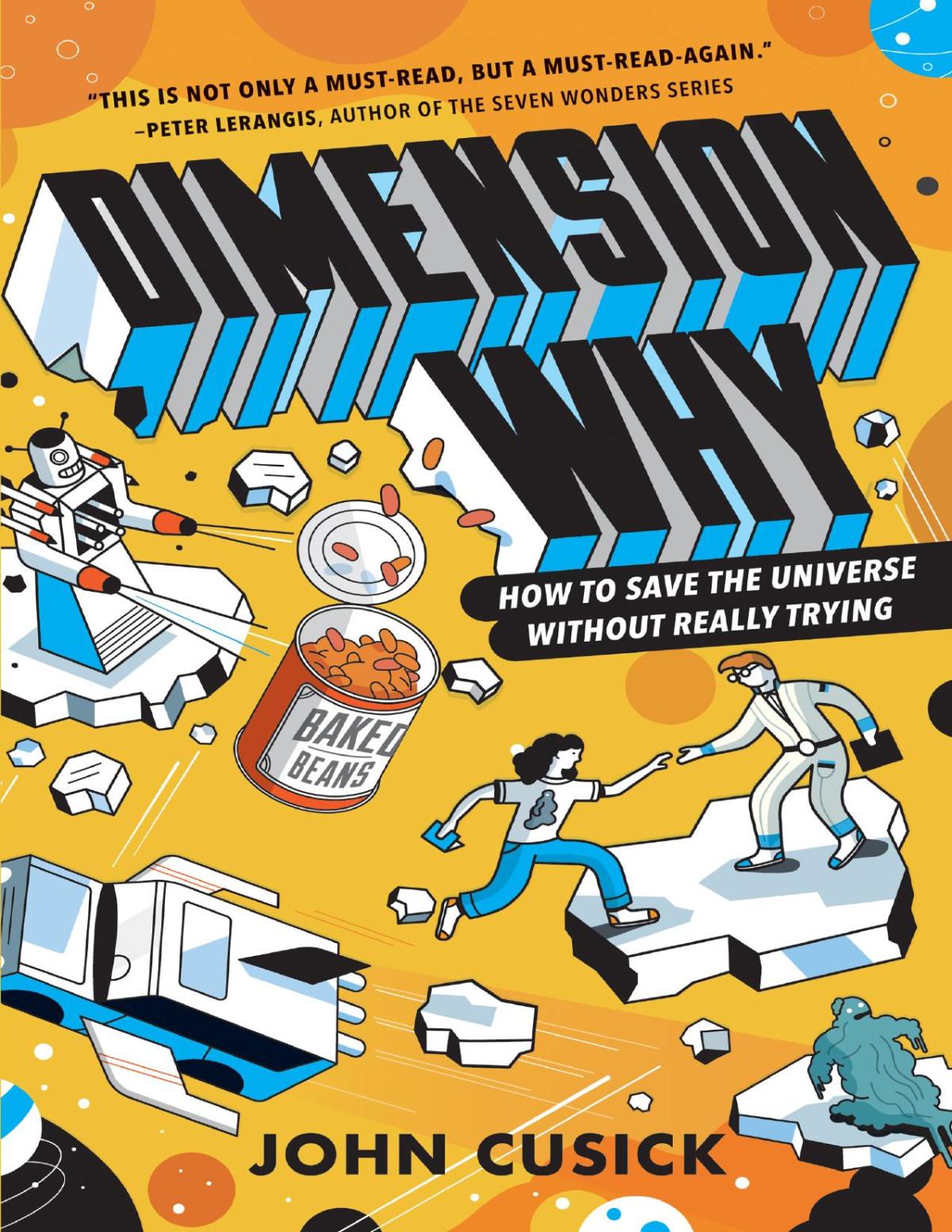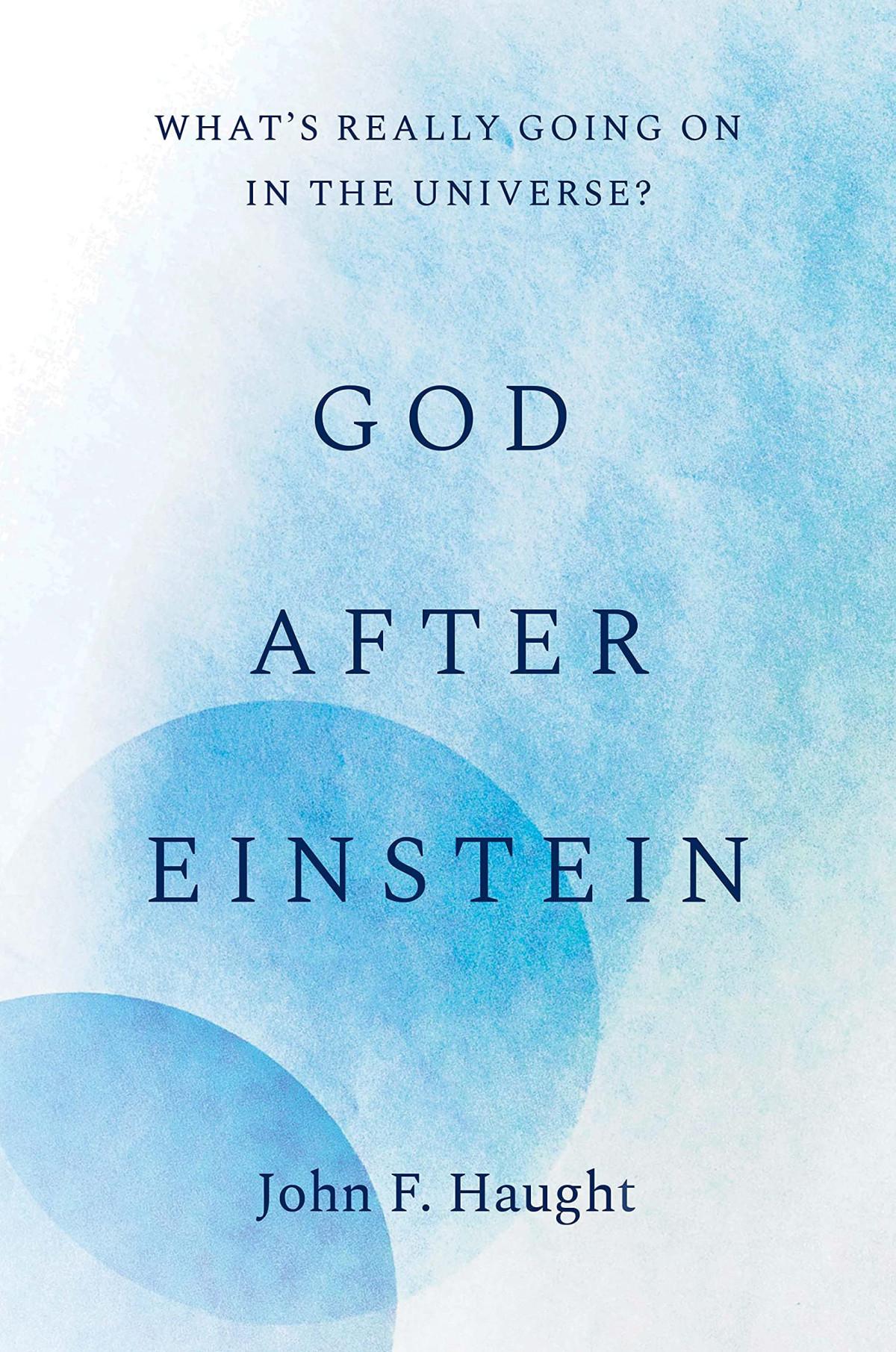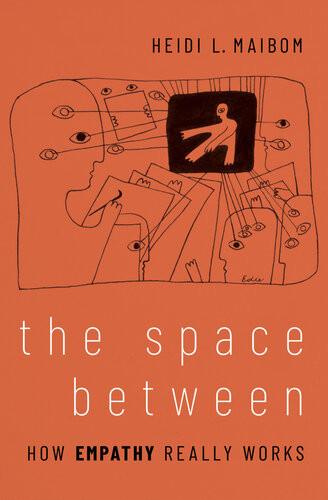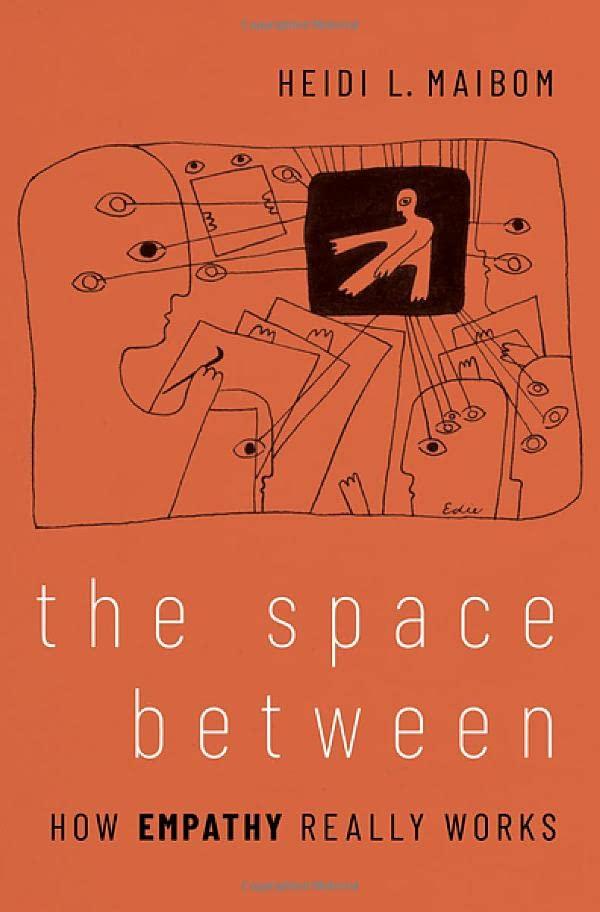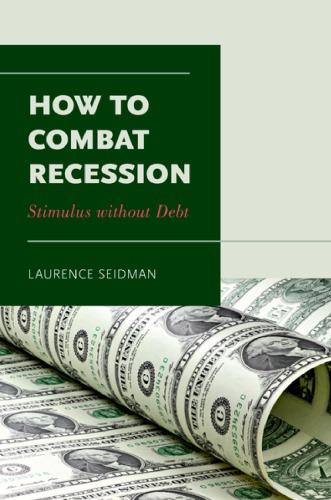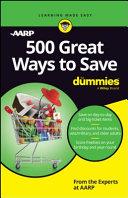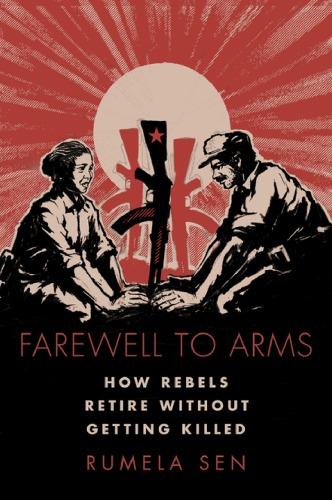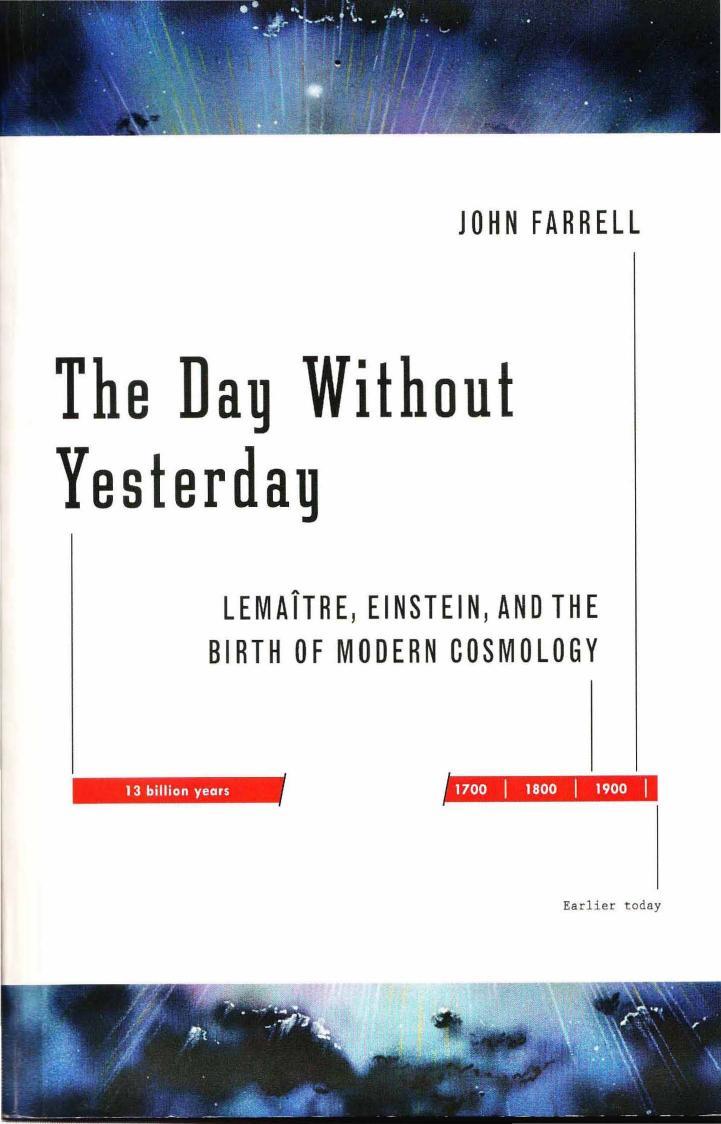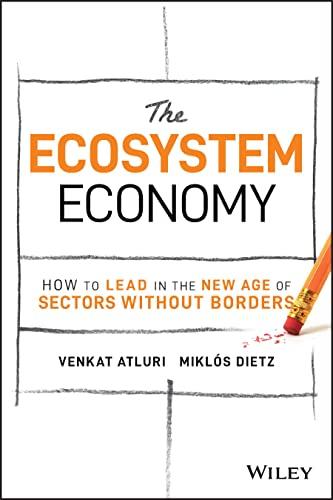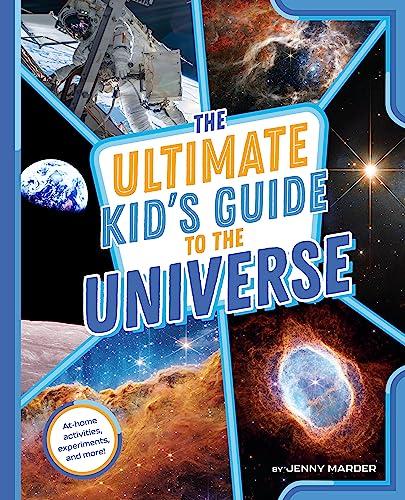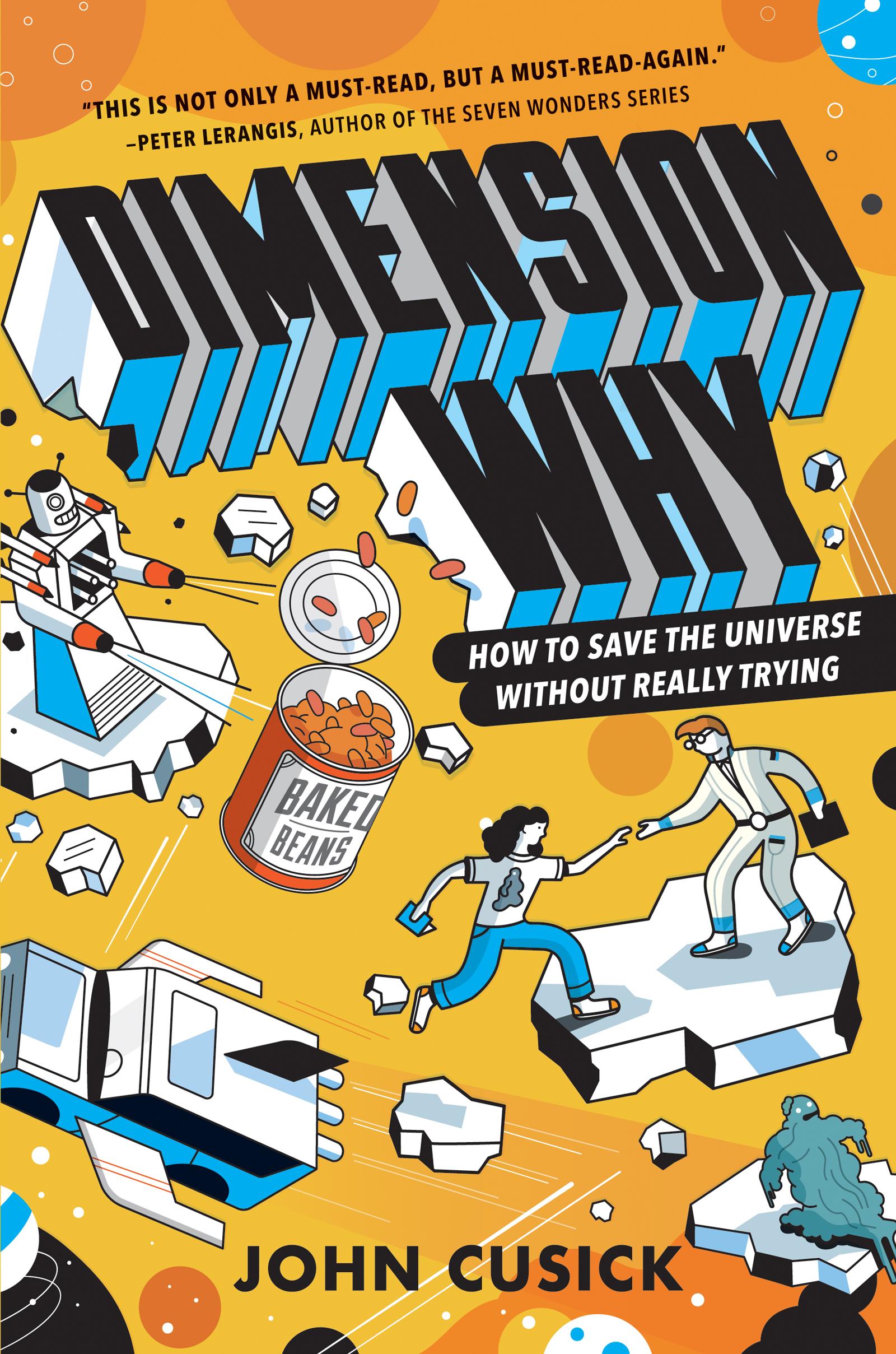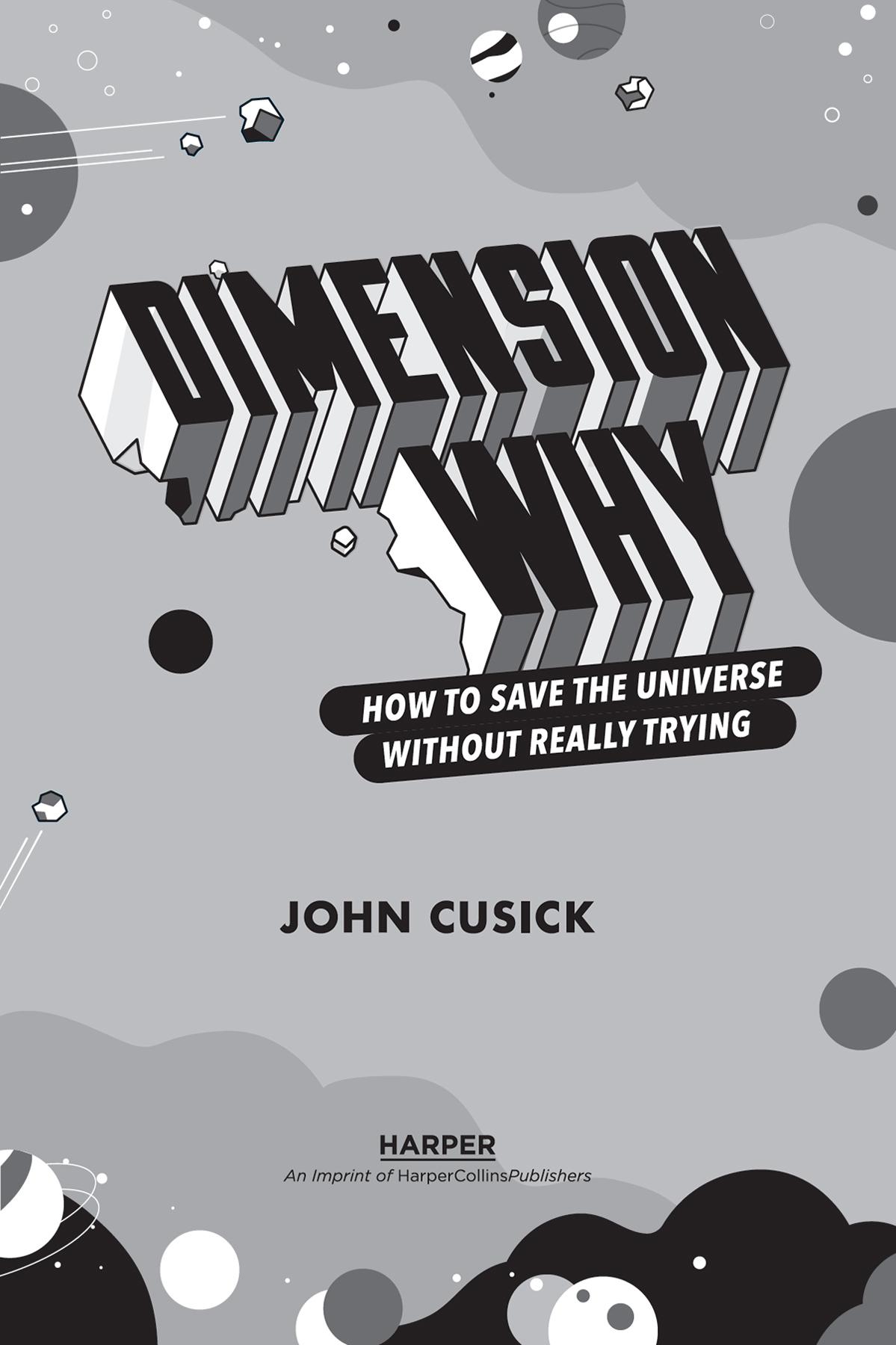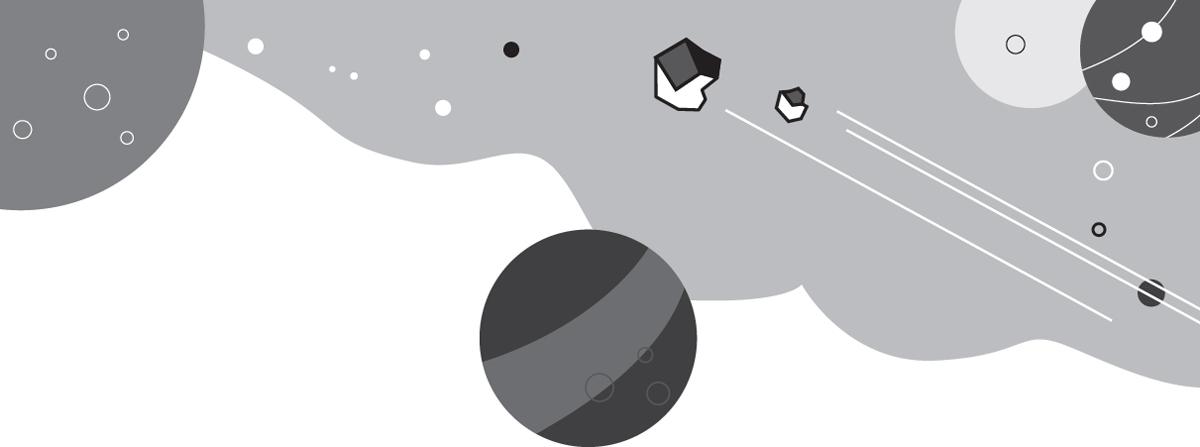Part 1
The Phenomenal, Cosmic Significance of Baked Beans
1PHINEAS T. FOGG WAS bored. He didn’t often get bored. He was intelligent (according to him) and rich (according to pretty much everybody), and when you’re clever and have lots of money, it’s rare to find yourself with nothing to do. The odds of this happening were somewhere around seventysix thousand to one. That’s in the super unlikely to absurdly unlikely range. And yet, here Phineas was, in the penthouse of his family’s own building, in a room full of the most sophisticated and expensive gadgets in the galaxy, improbably bored.
Though Phin didn’t know it yet, it was going to be one of those days when super unlikely to absurdly unlikely things happened a lot.
He’d been sprawled on the floor a good twenty-six minutes. His food replicator lay in pieces (he’d disassembled and reassembled it so many times he’d lost count), his favorite vortex manipulator was now an invigorating shade of green (he’d tried painting it blue, then pink, then polkadot), and his Extraweb terminal—which accessed a super-vast, superentertaining network of just about every interesting clip, article, program, or game one could imagine—lay dormant.
Some days, even cat videos lose their charm.
“I’m bored, Teddy,” Phin said aloud.
“Let’s play a game,” said the large, slightly dingy teddy bear sagging in the corner.
“I don’t want to play a game. We’ve played every game. We played Candy Planet. We played Connect Four Billion. We played Apples to Gravleks. I don’t want to play them again.”
“Let’s play a game,” said Teddy.
Phin shut his eyes. “I appreciate your persistence, but I’m really not in the mood.”
“Let’s—” began Teddy.
“Play a game,” said both—one in a cheerful, slightly wobbly voice, the other in a very weary one.
In a galaxy full of incredibly articulate and intelligent robo-toys, Phin had an affection for Teddy, who wasn’t a robot really, but a stuffed bear with a semibusted voice box. In the beginning Teddy could say three phrases, including “I love you” and “Where’s my honey?” Now his internal circuitry was sufficiently degraded that only the third phrase, “Let’s play a game,” remained. But Phin knew Teddy loved him, even if he didn’t say it every day.
Despite having zero confidence it would be any more exciting than lying down, Phin sat up, his antiseptic white jumpsuit bunching around his middle. Sometimes, Phin thought, you have to try something as radical as sitting up just to see if the universe will reward your boldness.
In this case, it worked.
A panel on the ceiling slid away, and a bulb whose sole purpose was to strobe red and look alarming dropped into the room and flashed.
Phin jumped to his feet. “The mail’s here!”
He rushed to the chute and plugged in his PIN code. The mechanism hissed and whirred, unlocking one of the most sophisticated security systems money could buy. A door slid open. In the antechamber stood an unenthusiastic android, about four feet tall, with a screen for a face. Phin could tell the android was unenthusiastic by the way it crossed its arms and tapped its foot.
The words You Have Received an Extraweb Gram scrolled across its display.
Phin felt a mixture of excitement and melancholy, the same blend of emotions he experienced whenever his parents made contact.
There then appeared an image of two healthy, attractive people who looked a lot like Phin except older, tanner, and less bored. Phin’s parents
wore matching safari gear, complete with pith helmets and sub-ether goggles, making them both look a bit like android beekeepers.
“Hello, Phinny!” Phin’s mother waved. He hated when she called him that.
His father grinned. “Hello, Phineas, we love you!”
“We love you so much!”
“Hi guys,” said Phin. “How’s the safari?”
“Absolutely brilliant,” said Eliza Fogg. “We so wish you could experience it.”
“If it weren’t so incredibly dangerous,” Barnabus Fogg added.
“Yes, if it weren’t so dangerous, we would love it if you were with us.”
“You’d just love it,” said Barnabus. “The wildlife is incredible here on . . . El, where are we today?”
“Neptune the Second, near the Frillian Riviera,” said Eliza. “There are giant serpents you can ride!”
“And flowers that spin cotton candy!” said Barnabus.
“That sounds amazing,” said Phin, and he meant it.
Phin’s parents had been enjoying a tour of the galaxy for the past eleven years. It had begun as a Let’s go on vacation before we have kids kind of thing, then transformed into a Let’s make sure we see the eastern arm of the Milky Way before Eliza gives birth sort of trip, then briefly a Let’s just pop home and have this baby so we can catch our flight to the Horsehead Nebula situation. In fact, Phin had no memory of his parents that didn’t involve an Extraweb Chat or Extraweb Call or Extraweb Gram like this one. Eleven birthdays, eleven Christmases, and twenty-two semiannual Child Appreciation Days had all gone this way: Mom and Dad off in some exotic location; Phineas alone, in his room, wishing he were with them.
“Do you think maybe next month I could come meet you? Say on Ursa Six?” Phin had his parents’ itinerary memorized—no mean feat, as it was constantly changing and expanding, like one of those star-eating Newtonian blobs, but a lot more expensive.
“Next month?” said Barnabus.
“What’s next month again?” said Eliza.
“My birthday,” said Phin, patiently, lovingly, furiously. “I’m turning twelve.”
There was an awkward pause.
“Let’s play a game,” Teddy offered.
“You said I could travel with you when I turned twelve,” said Phin. He only reminded them of this every time they spoke. “Remember?”
“Phinny,” said Mom.
“Phineas,” said Dad.
“Phin,” said Phin.
“You know we miss you, angel, but the galaxy is such a huge and dangerous place.”
“Too dangerous,” added Barnabus, “for a child. Why, your mother’s been kidnapped six times this week alone!”
“It’s true! And a space wizard shrunk your father to the size of a proton for an entire afternoon!”
“If anything ever happened to you,” said Barnabus, his eyes glistening with real tears, “buddy, I just don’t know what we’d do.”
“If you’re bored,” Eliza added, “why not see if Goro wants to play Apples to Gravleks?”
Goro Bolus was not Phin’s idea of a good playmate. He was Barnabus and Eliza’s business partner, the Bolus in Fogg-Bolus, and in addition to being an adult, he was also the nastiest, creepiest adult Phin knew personally.
“I’d rather not,” said Phin.
“Eliza, get Goro on the line,” said Barnabus.
“No, don’t—!” started Phin, but it was too late. Eliza punched up the conference line, and suddenly the bulbous face of Goro Bolus flickered onto the screen. Bolus was an Arbequian, which meant he resembled, in the opinion of most Earthlings anyway, a very large bean. He was short, even for his species, and wore a pair of unflattering spectacles. The incoming call had startled him, and Bolus scrambled to cover up some blueprints on his desk.
Goro Bolus always looked like you’d just caught him doing something evil.
“Goro!” said Barnabus. “Hey buddy, you busy? Got a moment to hang out with Phin?”
“Barnabus! Eliza! Uh . . .” Bolus tried a smile, which was clearly not his forte. “And, um, hello. Phineas.”
“Hey, G-Sauce,” said Phin, who knew Bolus loathed all nicknames, and that one in particular.
Bolus gritted his disturbing little teeth. “I’m afraid I’m in the middle of something a bit, um—”
“ . . . sinister?” suggested Phin, who didn’t share his parents’ unwavering trust in their business partner.
“Urgent,” sneered Bolus. “Terribly sorry. Have to jump off. Lovely to see the Fogg family as always. Goodbye!”
His line went dead.
“He’s so dedicated,” said Eliza.
“What a guy,” said Barnabus.
“It’s fine,” said Phin. His parents were always encouraging him to bond with Bolus, as if he were some kindly uncle and not the weirdo who ran the company while they traveled the galaxy. The one thing Bolus and Phin had in common was that neither wanted anything to do with the other.
“Hey,” said Barnabus, his voice dripping with sympathy. “Hey, trust us, pal. Just a few more years. When you’re older, you can come along.”
“For now just sit tight, Phinny.”
“In my room,” said Phin.
His parents nodded solemnly, lovingly, maddeningly.
“It’s really the safest place,” said Barnabus.
“The safest place in the galaxy,” said Eliza.
“Okay,” said Phin.
After an exchange of air kisses and I love yous, the screen went blank. The postal android cleared its throat and held out a hand for a tip. Phin ignored it and closed the hatch.
Kidnapping. Space wizards. It all sounded so glorious, and Phin wanted to be a part of it.
Instead he was stuck.
Alone.
With Teddy.
He slumped into his chair, did a few spins for good measure, and sighed. Maybe his parents were right. After all, it was just as good seeing the rollercoaster serpents of Neptune the Second in high-def 3D.
Wasn’t it?
“Insanely safe,” said Phin, which was the motto of his parents’ company, the Fogg-Bolus Hypergate and Baked Beans Corporation. “That’s best. Isn’t it, Teddy?”
“Actually,” said a voice that was nothing like Teddy’s, “I think that sounds awful.”
A THOUSAND YEARS EARLIER, Lola Ray was standing in the security line at Newark Liberty International Airport, on the planet Earth, at the start of the twenty-first century, at just after eight fifteen in the morning. But she was trying to stay positive.
She had a backpack on one shoulder; an overnight duffel on the other; her infant sister, Mary, in her arms; and her slightly older but still-too-tiny-to-beleft-alone-for-ten-minutes sister, Gabby, wrapped around her right leg. She’d been up since five a.m. sister-wrangling, packing socks, and making snacks for the trip, and she was exhausted, hungry, and sore.
But she was trying to stay positive.
“Where is it?” Lola’s mother said for the tenth or eleventh time, rummaging in their carry-on. “Hold this.”
She handed Lola the family cell phone, or tried to, since Lola had no free hands, then tucked the phone into the crook of Lola’s elbow.
“Yes, I know,” Lola cooed to her baby sister, Mary. “Momma’s gonna find Mr. Boop, don’t worry.”
Mary was screaming.
Gabby squeezed Lola’s leg and shouted, “Drag me!”
The scenario was not unusual. Lola was used to looking after her siblings. She and Momma were a team. It was them against the world,
especially since Papa had taken the research job in Vancouver. Lola was always ready to change a diaper or play Dora the Explorer. She was the responsible one, according to her mother, and so good with the holy terrors. Lola took care of things.
She also took care of her mother.
Lola looked up from her screaming sister and squinted at Momma. “I think,” she said in her most adult voice, “it’s in your hair.”
“My what?”
Shrugging the baby and cell phone into one arm, Lola reached up and plucked a rubber pacifier from the tangle of curls on her mother’s head. She showed it to Mary and went “Boop!” on her nose before giving it to the baby to suck.
Momma sighed. “What would I do without you?”
It was an excellent question.
As the line shuffled a few steps closer to the security checkpoint, Lola imagined what she would do without her family. This flight to Vancouver had originally been a Lola-only trip. Summer vacation had just begun, and for the first time ever, Lola was going to travel alone, a just-her-and-Papa trip, no baby sisters, no Momma rolling her eyes at the comic books Lola liked to read. Just seven days of running around Papa’s apartment complex, watching whatever she liked on Papa’s iPad, and talking to him all about the obsession they shared—the TV show Dimension Y. Dimension Y was all about flying through time and space, having adventures, and saving the day. There were no sisters or pacifiers in Dimension Y, and Lola knew this because she’d seen every episode more than three times.
Then Momma and Papa had that big fight on the phone about Papa being gone for so long, and Momma had cried, and her voice had gone soft and plaintive—Lola had heard it all through the bedroom wall—and suddenly Lola’s solo trip was turned into a family event, all four Ray women flying to Canada. “Won’t that be fun?” Momma asked, and Lola had made herself smile. She was still smiling now.
When at last it was their turn, Lola handed back Momma’s cell phone, as well as Mary, and pried Gabby off her leg. Momma went through first with the baby, then it was Gabby’s turn, until at last it was just Lola.
She closed her eyes, and for a moment imagined she truly was on her own. Not just on her own, but a grown-up, about to jet off to an exotic location, to see the world.
The security guard beckoned her on with two fingers. She stepped to the line and presented her passport and ticket.
“Vancouver, eh?”
“Yes, sir,” said Lola, who was unfailingly polite, especially to people in uniform. “It’s my first time going to another country,” she added, which was true. Her passport was crisp and blue, and had never been used.
The guard smiled. “It’s a day of firsts. We’ve got a new X-ray gate. Supposed to be a lot safer.”
“Safer?” said Lola.
The guard scanned her passport and handed it back. “Well, it hasn’t turned anyone into a Bog Mutant yet.”
For a moment his comment puzzled her, then Lola remembered she was wearing her Dimension Y T-shirt, the one with the stencil of monstrous Bog Mutants crawling out of alien goo.
“You’re into Dimension Y?”
The guard nodded. “Just started the two-part finale. Did you see it?”
“It’s so amazing!” Lola said—so loud she startled herself. She wasn’t used to grown-ups taking an interest in her opinions, let alone sharing her love for things like Dimension Y. Her father was the only adult she knew who watched it. “Sorry. I just binged the whole final season.”
The guard pretended to cover his ears. “No spoilers!” he said, and smiled at her.
Lola moved forward and felt herself glowing. She decided then to rewatch the finale on the plane, if the plane had Wi-Fi, which Momma said it would. She’d wait until Momma was asleep and then use her cell phone. Maybe she’d have a few hours to herself after all.
Lola stepped up to the X-ray machine. She could see Momma and the girls waiting for her on the far side. The new X-ray gate, as the security guard had called it, was a bland gray archway with a few blinking lights up the side. A flashing sign on top said WAIT, then MOVE AHEAD.
Lola did.
“Hold still,” said the guard on the other side.
Lola found it nearly impossible to hold still when someone told her to. She’d been standing in line for what felt like hours without any trouble, and now felt an overwhelming impulse to shimmy, jump, and do the Mashed Potato.
And worse, she felt a sneeze coming on.
“Hold on,” Lola said.
“Hold still!” snapped the guard.
Lola could see her mother checking her watch, juggling Mary in one hand and her bag in the other.
“I think I’m going to—” she started.
Then Lola sneezed.
It was a heckuva sneeze.
When it was over, she opened her eyes and straightened, blinking. Something was wrong. She blinked again. Someone must have shut off the lights. There was a power outage of some kind, a blackout (she’d been through one of those during a hurricane a few years back).
But in movies, when the lights go out in a public place, everyone starts screaming or going oooooo.
No one screamed, no one went ooooo. No one was making a peep.
Lola was alone.
“Hello?”
Lola’s voice echoed in what sounded like a very large, unfriendly space. She cleared her throat. Something dug into her hand, making her jump; then she remembered she was holding her passport. Reassured by its presence, she spoke again. “Hello? Is anybody there? What happened? Where did the lights go?”
As if to answer her question, a brilliant green beam of light swept through the emptiness before her. It seemed to search the dark, passing over unusual shapes that lurked in the void. Lola went cold.
“Identification!” said the thing behind the light.
Its voice was unlike any she’d ever heard, a cross between a bullfrog’s croak and that feeling you get just after banging your elbow but before the shooting pain makes you go half crazy. It filled Lola with a sickening dread.
“Um . . . ,” she said.
“Identification!” the voice said again.
Not sure what else to do, Lola extended her passport into the darkness.
A hand—she hoped it was a hand—snatched her passport away. It disappeared into the gloom behind the green light, which shone in Lola’s eyes and was giving her a headache.
“Mmmm,” said the voice. “Well, Ms. . . . Passport, if that is your real name. I’m afraid you’re in an awful lot of trouble.”
“Wh-what?” said Lola.
The thing with the dreadful voice stepped out of the shadows. Lola’s mind split. One half wanted to scream, the other to go mute forever. Because the creature standing before her in this lifeless place was almost certainly no, definitely—a Bog Mutant.
Its uniform read Temporal Transit Authority.
THERE WAS AN ALIEN in Phin’s bedroom.
In his bedroom. With his stuff. Breathing his air. And it was wielding a hair dryer.
“Identify yourself, alien!” he demanded, trying to sound imposing, which was difficult to do while hiding behind your bed. “And . . . stay where you are!”
The alien didn’t respond. Instead, it cleared its throat and adjusted its grip on the hair dryer, which it leveled at Teddy’s head.
Phin tried a different approach. “Okay. Then how about you tell me why you’re pointing a hair dryer at my bear?”
“This isn’t a hair dryer,” snapped the alien. “It says Vaporizer.”
“That’s the brand name,” said Phin.
“Oh,” said the alien, and cleared its throat again. “Well, then why did you scream?”
“I didn’t scream,” said Phin.
“You definitely screamed,” said the alien. “Piercingly.”
Phin was so offended he almost stood up. But there was still a potentially dangerous hair-dryer-wielding alien in his room, and so he stayed put. “You surprised me.”
“I’m sorry,” said the alien, which struck Phin as a funny thing for a murderous alien to say. “It’s just, I heard your conversation with your parents,” it—she—went on. “I didn’t mean to eavesdrop, I couldn’t help it.” She lowered the hair dryer ever so slightly. “It sounded kind of . . . rough.”
“It wasn’t,” said Phin. “I love talking to my parents. They’re awesome. They bought me all this.” Phin gestured to the impressive collection of things.
“Okay,” said the alien. “Why did you call me an alien?”
“Aren’t you one?”
“No,” said the alien. “Are you?”
Phin wasn’t sure how to respond to this, so he decided to do what any respectable Fogg would do. He offered his visitor a snack.
“Would you like some baked beans?”
The alien, or whatever it was, sighed in what sounded like extreme relief. “That would be amazing. I’m absolutely starving.”
“But first you have to promise not to kill me,” said Phin. “Oh, and unhand my bear.”
“I don’t want to kill anyone.” The alien’s voice began to tremble, as if it were about to spew a poisonous venom blob—or, if it wasn’t in fact an alien, just cry. “I want to go home.”
Feeling pretty sure he wasn’t about to be blow-dried to death, Phin came out from behind the couch.
“I’m Phin Fogg,” he said, extending a hand to shake. The alien hesitated, then lowered the Vaporizer and stood. For an alien, she looked an awful lot like a normal human girl in an ugly T-shirt. The shirt had the words Dimension Y written on it, and a stencil of some naked security guards getting out of the bath, which was a bit weird.
“My name is Lola Ray,” she said. “And I am seriously lost.”
LET’S
REWIND A BIT.
“I said,” said the Bog Mutant. “You’re in an awful lot of trouble, Ms. Passport.”
The Bog Mutant pulled a notebook from his ill-fitting Temporal Transit Authority uniform. The uniform was just like any other uniform Lola had seen before—sort of blue-gray, drab, and ill fitting. But instead of being occupied by a person, it was filled with walking, talking green sludge. The seams bulged in odd places and didn’t look particularly dry. The notebook in the Bog Mutant’s gooey hand was also soaked, the pages thick and pasty. With its other gelatinous appendage, the creature extracted a pen, and though the pen was already slick with slime, it moistened the nib with its blunt green tongue.
“Okeydokey,” said the Bog Mutant. “Let’s do the questions!”
It cleared its throat, poised the pen just over its pad, and then, as if reciting from a memorized list (which it was), asked, “When did you come from?”
“Sorry?” said Lola. She was still not quite used to the sickening sound of its voice, but the sound was like an old friend compared to the sickly sight of its owner.
“No, no,” said the guard, “You’re supposed to answer the questions. You can say you’re sorry later.” The creature frowned. “I’m pretty sure that’s how
it goes. Questions first. Then accusations. Then tears and apologies. Yeah, that’s right. So, Ms. Passport, When did you come from?”
“Oh. Uh, um . . . ,” Lola replied intelligently. “I’m so sorry, Mr. . . .” “Jeremy.”
“Mr. Jeremy—”
The guard chuckled, a sound like pudding on the boil. “No, no. Mr. Jeremy’s my father. Call me Jeremy!”
“Okay, uh . . . Jeremy,” Lola tried again. “I’m so sorry, but I don’t know where I am or how I got here.” She glanced around the space they were standing in, which, as her eyes adjusted to the light, seemed more and more like an artificial cavern. It was as if they were standing in the storage basement of a large building—which is exactly what it was.
“I was in Newark.”
“Are,” said Jeremy, trying to make a note on his pad. “You are in Newark. Don’t worry, tenses are hard. Especially with time travel. I had to take a whole seminar on it. Part of the training. Is. Are. Was. Would-havebeen-being-en. I still have my flash cards, if you wanna see ’em.”
“Did you say time travel?” asked Lola.
Now, here’s the thing.
Lola had read hundreds of science-fiction books, had seen Time Junkies and Quantum Blip: The Movie on opening night. She’d rewatched the Dimension Y: Clock-Smashers miniseries more times than she could count. In those sorts of stories, it always took the hero a really long time to put it together that, oh!, aliens really do exist, or, wow!, there’s suddenly a dinosaur in the bathtub, or, holy cow!, they’d been transported to Dimension Y. There was always lots of But . . . ? You . . . ? How . . . ? What . . . ? Lola always prided herself that if ever something truly fantastic happened to her, she’d be able to wrap her brain around it right quick. And indeed, she did.
“Oh!” she said with a kind of giddy pride. “I time traveled! I traveled in time!”
This, it turned out, was the absolute worst thing she could have said.
Jeremy nodded. “A confession! Oh, well, that makes things easy. Let’s get you to prison, then. You’ll now be liquefied for easier transport to the nearest Temporal Transit Authority detention center, where you will be horribly interrogated.”
“Liquefied?” said Lola. ““But . . . ? You . . . ? How . . . ? What . . . ?”
“I’m under strict orders to incarcerate any known time travelers, Ms. Passport. Just because you’re the first one anyone’s ever seen, that don’t change the rules.”
“Wait,” said Lola. “You arrest time travelers, but I’m the first one?”
“There was bound to be one sooner or later.” Jeremy shrugged. “Me and the guys, we’ve been waiting for a time traveler to show up for, oh, a little over a hundred years now. That’s a pretty long coffee break.” Jeremy chuckled that boiled-pudding sound again. “I know it sounds great, but it gets really boring. There’s only so many games of pinochle a guy can play before he starts to feel pretty useless. It’s great to finally put all that training to use. Now, if you’ll just step up to the line and look into this light probe, you’ll be melted automatically—”
“But wait!” said Lola. “I haven’t done anything wrong! I didn’t mean to time travel! I was just minding my own business and then I sneezed and then bam.”
“Ignorance of the law is no excuse,” said Jeremy, as if he were reciting something he’d read. Which he was.
Lola thought about how the responsible thing to do was to calmly explain how this was all crazy, that she was just an innocent bystander, and there had been a huge misunderstanding. Surely this Bog Mutant in a uniform would listen. Surely there was sense and logic in this world. Surely this Temporal Transit Authority was as reasonable as any other authority.
On second thought, Lola chose to be wildly irresponsible.
“Excuse me,” she said. “Is that a zipper on your uniform?”
“Sure is,” said Jeremy. “Buttons are tricky for me.”
“Great. One sec?”
Before Jeremy could react, Lola yanked at his zipper. There was a startling zzzzzzzzt! sound, and then a big gooey splash like someone had emptied a garbage bag full of yogurt onto a concrete floor.
“Hey!” shouted Jeremy, who was now mostly a puddle.
Lola ran. Behind her, Jeremy the puddle cursed and shouted at her to come back. She leaped over boxes and dived around crates. She slid under piping and ductwork and passed what looked to be a pyramid of stacked metallic objects—like the canned-goods promotional displays at her grocery store. She ran through the storage basement, the beam from Jeremy’s green flashlight receding behind her, growing fainter, until she lost track of it completely and was once again on her own.
She found herself in a gloomy stairwell and climbed up and up, coming at last to a door that opened onto a long hallway so white and clean it made her eyes burn. Picking a direction at random, she followed the bright corridor, her sneakers slapping against the polished floor.
After a while, having seen no one at all, Lola came to a large, vacant atrium. The ceiling arched beautifully overhead, gleaming and modern. The space looked as if it were meant to accommodate hundreds of visitors on a busy day. Now, though, the great peaked foyer was empty and cold. Standing in the center was a statue. It was, upon consideration, the ugliest statue Lola had ever seen.
The bulk of the statue was a wide cylinder, about six feet high, with ridges along the side almost exactly like a tin can. Stepping closer, her breath loud in her ears, Lola saw that it was, in fact, a statue of a tin can. But why anyone would erect a statue revering a tin can—a can of baked beans, from what she could gather from the label painted on the front—was beyond her.
This is what the lettering said:
The Fogg-Bolus Hypergate & Baked Beans Corporation “Insanely Safe!”
Est. 2399
Because it seemed like the sort of thing people did in these situations, Lola said the date aloud in a kind of awed whisper.
“Twenty-three ninety-nine?”
In a daze, she turned, hoping to see something that would make her feel better. Bay windows lined the far wall. They were circular, like portholes, and daylight streamed through. Lola looked out to get a sense of where she was, to get a vantage on her situation. What she saw didn’t improve her mood.
Newark had seen better days, and that was saying something.
New Jersey in the future—for that’s what Lola felt certain she was in was a vast and barren wasteland. Where once had been highways there was now rubble and dust. Twisted scaffolding reached out from the ruin like claws, and who knew what these structures had once been, or been part of. The horizon was a jagged gray line, and nothing stirred save wisps of swirling dust. It was the emptiest place Lola had ever seen, and all at once she felt so terribly alone.
Her mother. Her sisters. Even her father. If this was the future, that meant they were all . . .
Lola decided not to think about it. Not thinking about it helped, but not by much.
She had only a moment to console herself before a new sound made her jump. Something squeaked and groaned back the way she came, and other sounds, strange and mechanical, echoed from deep within the building. Something big, perhaps the building itself, was powering up. Or powering down, Lola couldn’t be sure. Thinking fast, she made for a set of panels on the far wall. One of these was open, revealing a small space just large enough to hide inside. She climbed in, closing the door and blocking out the light, the statue, and the view of the ruined world.
She held her breath. She listened. Something thumped below her. She thought she heard a door swing open somewhere. Then, so close it made her yelp, something went click and buzzzzz in the tiny compartment. Lola lurched.
She was moving.
The compartment was moving.
The pressure in her stomach told her she was hurtling upward. She was in some sort of elevator, though not an elevator for people—it was too small for that; Lola had to tuck in her knees just to fit. It was some sort of dumbwaiter, hurtling up through the lonely structure, a shiny skyscraper built on the ruins of a desiccated city in a strange and frightening future.
What Lola didn’t know was that the dumbwaiter went all the way up, to the penthouse in fact, where the building’s sole occupant, the heir to the Fogg-Bolus Hypergate and Baked Beans Corporation, resided.
